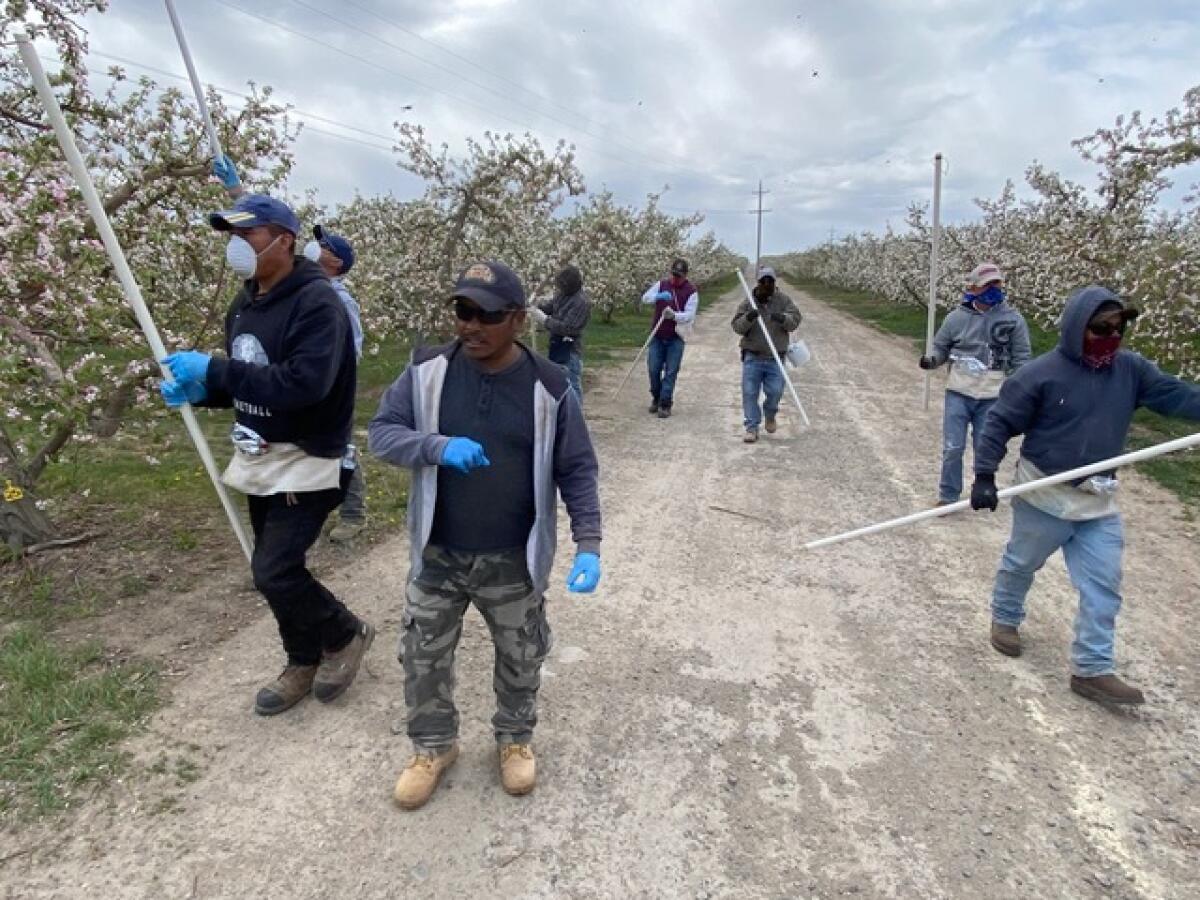A coronavirus debate on the apple orchard: Should migrant workers be allowed to sleep in bunk beds?

- Share via
YAKIMA, Wash. — The price and availability of apples in grocery stores this fall could come down to a critical question on the farm: whether migrant workers should sleep in bunk beds.
Each spring, as many as 30,000 farm laborers — most of them from Mexico — begin arriving in Washington state on guest worker visas and live in close quarters in housing that employers are required to provide. A typical room has two bunk beds.
The coronavirus pandemic has thrown the system into disarray, with public health officials and the union representing the workers warning that the sleeping arrangement could spread infections.
But farmers say banning employees from sleeping in top bunks — as the state has proposed — would force them to cut their work forces in half and drive many into bankruptcy, devastating the region’s economy and the nation’s fruit supply.
Washington produces 65% of the country’s $2.4-billion fresh apple crop, as well as cherries, peaches, berries and other fruit.
Representatives from the United Farm Workers and the powerful farm lobby spent seven hours Wednesday in an online meeting organized by Gov. Jay Inslee’s office to discuss the draft regulations with health, labor and industry officials.
In the meantime, workers are already arriving under contracts signed months ago.
“There’s an impending humanitarian crisis here with people with no place to stay,” said Dillon Honcoop, a spokesman for Save Family Farming, a state agricultural organization.
“And there could be a food system crisis, which would be the fault of state agencies and labor activists who don’t take into account effects of the rules they propose,” he said.
Those rules — drafted by two state departments, health and labor and industries — would require farms to ensure that workers can stay at least six feet apart while cooking, eating, bathing and sleeping.
Only the lower bed of each bunk could be used, except in a sleeping room occupied by a family. Beds would have to be placed at least six feet apart — up from the state-mandated three feet in normal times — or separated by installing plastic-sheeting walls between them.
Linsey Marr, an environmental engineer at Virginia Tech and an expert on airborne transmission of viruses, said that in addition to touching common surfaces on shared bunk beds, the simple act of breathing in close quarters could spread infection.
A person exhaling in a lower bunk would emit a plume of warm aerosols that would tend to rise, she said.
Or, she said, “If you’re on the top bed and, say, talking on a cellphone, larger droplets could fall down.”
Rules similar to those under consideration in Washington have already been adopted in neighboring Oregon, whose fruit industry is much smaller.
Michael Wood, who heads Oregon Occupational Safety and Health, said the extreme contagion of the coronavirus left officials no choice but to ban the use of top bunks.
“Social distancing is essentially impossible to implement, while sleeping, for the person on the bottom bunk and the person on top,” he said.
Bunk beds are common on farms in California, where several COVID-19 outbreaks have occurred among workers. But no single agency regulates farmworker housing, and the bunk issue has not arisen on a statewide level, according to state labor, housing and industrial relations officials.
In Washington, both farmers and labor representatives agree that extra hygiene and distancing measures will be crucial so that farms don’t become the next cruise ships and nursing homes as hot spots for the virus. But they have different visions of what protections are needed for the migrant workers.
Dan Fazio, executive director of Wafla, an organization that helps farms hire foreign workers through the H-2A visa program, said he believes that bunk beds provide plenty of distancing.
“Gee, one person sleeps with their head to the north and the other sleeps with their head to the south, and guess what, from high school geometry you’re six feet apart,” he said.
But he also worries that the virus could spread when workers move between farms and local communities.
“How are we going to get 20-year-old guys who think they’re Superman to socially distance?” he asked.
He takes some solace in the fact that the workers tend to be young, strong and from rural areas with healthy diets. His organization requires workers to have vaccination cards for mumps and measles, but no health screenings are conducted as a condition of employment.
An outbreak on a farm in central Washington last month illustrated how easily the virus could spread among laborers — but also how resilient they could be.
The farm is owned by Stemilt Growers, a company that employs more than 1,600 guest workers in Washington each summer. When six employees with coughs tested positive for COVID-19, managers isolated them and decided to test the rest of the workers in their dormitory-style housing unit.
Of the 71 workers, 38 were infected.
“At the time of testing none of them had a temperature, and only four stated they had a slight occasional cough,” Zach Williams, Stemilt human resources director, wrote in a court declaration last month.
Williams submitted his sworn statement in a lawsuit that unions filed April 15 against Washington state agencies, asking a judge to require them to issue clear, mandatory regulations concerning farm housing, working conditions and transportation.
Skagit Superior Court Judge Dave Needy declined to step in, other than to direct union and farm representatives to collaborate on devising rules on work conditions and transport, and report back to him on May 14.
The governor’s office convened Wednesday’s meeting to bring the parties and regulators together and advance the process. It is up to the state to make the final decision.
Officials excluded reporters and declined to release about 500 comments submitted on the drafts, but the Los Angeles Times obtained copies of proposals made by farm and union representatives.
The union proposed to take the controversial upper-bunk ban off the table while pushing employers to provide disposable gloves, grocery deliveries, access to COVID-19 testing and gas cards to discourage carpooling.
“Our top priority is to get something now that is binding and clear,” said Erik Nicholson, UFW vice president. “What’s frustrating is there are a number of employers here in the state that just aren’t doing anything to protect workers.”
It doesn’t take long to find examples of lax attention to safety. In Toppenish, Wash., 160 miles southeast of Seattle, eight field workers got into a van recently after a 10-hour shift in a hops field. None of the men sitting close together in the vehicle wore a mask.
Pedro, the 25-year-old driver, agreed to talk if his last name were withheld to avoid retribution from his employer. He said the group had come from Durango, Mexico, under contract for a third summer, and that the farm owner provided extra soap and hand sanitizer but no masks.
“He said if we feel sick, let them know,” Pedro said. “Sure we’re worried, but what can we do?”
In Oregon, the bunk bed ban takes effect June 1. Mike Townsend, president of Townsend Farms, based outside Portland, said it puts his business in a bind.
He has already committed to paying middlemen $1,000 for each of the 450 or so foreigners they have recruited to work for the berry and fruit enterprise at $15.83 an hour. Most are scheduled to arrive late this month and work through the summer.
Normally they are housed four to a room in trailer homes furnished with bunks.
If Townsend tells them not to come for lack of bunks, the farm will still be required to pay them 75% of their wages under the contract.
He said he felt blindsided by the bunk regulation. “I don’t know who to call,” he said. “What do you think I should do?”
More to Read
Sign up for Essential California
The most important California stories and recommendations in your inbox every morning.
You may occasionally receive promotional content from the Los Angeles Times.











